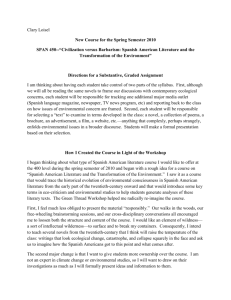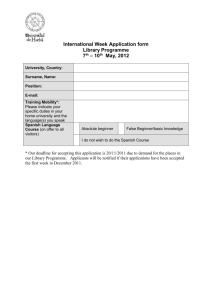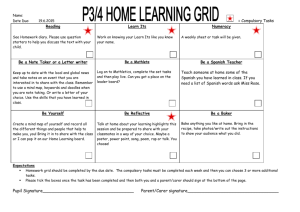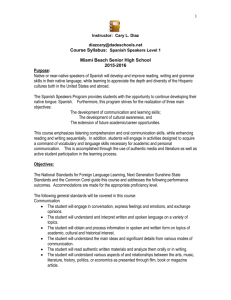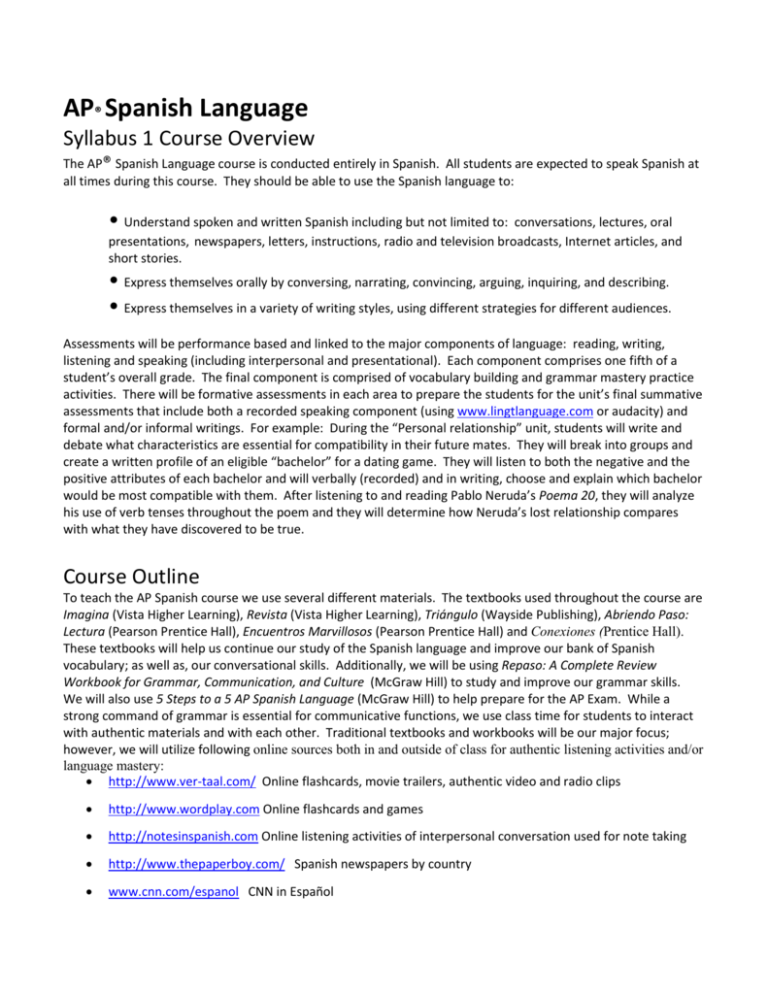
AP® Spanish Language
Syllabus 1 Course Overview
The AP® Spanish Language course is conducted entirely in Spanish. All students are expected to speak Spanish at
all times during this course. They should be able to use the Spanish language to:
• Understand spoken and written Spanish including but not limited to: conversations, lectures, oral
presentations, newspapers, letters, instructions, radio and television broadcasts, Internet articles, and
short stories.
• Express themselves orally by conversing, narrating, convincing, arguing, inquiring, and describing.
• Express themselves in a variety of writing styles, using different strategies for different audiences.
Assessments will be performance based and linked to the major components of language: reading, writing,
listening and speaking (including interpersonal and presentational). Each component comprises one fifth of a
student’s overall grade. The final component is comprised of vocabulary building and grammar mastery practice
activities. There will be formative assessments in each area to prepare the students for the unit’s final summative
assessments that include both a recorded speaking component (using www.lingtlanguage.com or audacity) and
formal and/or informal writings. For example: During the “Personal relationship” unit, students will write and
debate what characteristics are essential for compatibility in their future mates. They will break into groups and
create a written profile of an eligible “bachelor” for a dating game. They will listen to both the negative and the
positive attributes of each bachelor and will verbally (recorded) and in writing, choose and explain which bachelor
would be most compatible with them. After listening to and reading Pablo Neruda’s Poema 20, they will analyze
his use of verb tenses throughout the poem and they will determine how Neruda’s lost relationship compares
with what they have discovered to be true.
Course Outline
To teach the AP Spanish course we use several different materials. The textbooks used throughout the course are
Imagina (Vista Higher Learning), Revista (Vista Higher Learning), Triángulo (Wayside Publishing), Abriendo Paso:
Lectura (Pearson Prentice Hall), Encuentros Marvillosos (Pearson Prentice Hall) and Conexiones (Prentice Hall).
These textbooks will help us continue our study of the Spanish language and improve our bank of Spanish
vocabulary; as well as, our conversational skills. Additionally, we will be using Repaso: A Complete Review
Workbook for Grammar, Communication, and Culture (McGraw Hill) to study and improve our grammar skills.
We will also use 5 Steps to a 5 AP Spanish Language (McGraw Hill) to help prepare for the AP Exam. While a
strong command of grammar is essential for communicative functions, we use class time for students to interact
with authentic materials and with each other. Traditional textbooks and workbooks will be our major focus;
however, we will utilize following online sources both in and outside of class for authentic listening activities and/or
language mastery:
http://www.ver-taal.com/ Online flashcards, movie trailers, authentic video and radio clips
http://www.wordplay.com Online flashcards and games
http://notesinspanish.com Online listening activities of interpersonal conversation used for note taking
http://www.thepaperboy.com/ Spanish newspapers by country
www.cnn.com/espanol CNN in Español
www.un.org/radio/es Radio Naciones Unidas
www.apple.com/intunes iTunes
http://www.record.com.mx/ Website devoted to sports news with an emphasis on soccer
http://tools.verbix.com/webverbix/Spanish.html?verb=ser Verb conjugations
http://www.conjuguemos.com Verb conjugation and vocabulary building
http://espanol.yahoo.com/ Yahoo en español
http://www.colby.edu/~bknelson/SLC/index.php B.K. Nelson (Colby University) practice activities
http://www.fcps.edu/DIS/OHSICS/forlang/spanish/stars/index.htm Spanish games for reinforcement
http://www.bbc.co.uk/languages/spanish/ Flashcards, video clips, and activities
http://www.wordreference.com/ Online dictionary
http://zachary-jones.com/spanish/clozeline Songs with comprehension activities
http://www.youtube.com Videos in Spanish
http://tu.tv/ Videos in Spanish
Each week we will write short essays and/or journal entries on a prepared topic. A small English-Spanish
dictionary will be needed daily; however, it is our goal to become less dependent on outside sources for
additional vocabulary and spelling as the course progresses. The journal will serve as a practice of writing skills
and will allow students to reflect on relevant themes using the target language. We will also discuss the topic as a
group. We may share the information with each other, have a debate, or try to persuade one another to consider
an opposing viewpoint on an issue. We will finish with a more formal essay related to a topic at hand. Written
work and spoken conversation or presentations will be evaluated using ACTFL Proficiency Guidelines. Our overall
goal is that by the end of the year, we will communicate at a sustained Intermediate High or Advanced Low level.
Each week, we will have a quiz on expanded vocabulary reviewed outside of class. This additional vocabulary will
be from the Triangulo workbook, from the www.ver-taal.com online flashcards, from the www.wordplay.com
online flashcards, from a list provided by me or from in-class or outside reading. Students will present and discuss
current issues from our Imagina or Revista textbooks, or from newspapers and internet news. This will not only
help the students improve their reading, speaking, and listening skills, but will also keep everyone up-to-date on
events taking place in the Spanish speaking world.
Part of our formative and summative assessments will be shorter, mock AP Exams using multiple-choice items
from past released exams, and free-response questions that are similar in type and difficulty to those on the AP
Exam. These assessments will often include essays relating to themes found in pieces of literature read during the
semester. These prompts will be similar in type and difficulty to those on the AP exam. In order to ensure
students are progressing as needed, there will be no exam exemptions for AP Spanish Language. Both semester
exams will be mock AP exams to prepare students for the format and pacing of the culminating event.
Texts
● Blanco, Jose A. Revista: Conversación sin barreras: 3rd Edition. Vista Higher Learning: Boston, Massachusetts.
2010.
● Díaz, José L. AP Spanish Preparing for the Language Examination. Prentice Hall 2007.
● Blanco-Tocaimaza-Hatch. Imagina: 2nd Edition. Vista Higher Learning: Boston, Massachusetts. 2011.
● Collins, Stephen J, Díaz, José M , Nadel, Maria F. AbriendoPaso: Lectura: Rev. Student Edition.
Pearson/Prentice Hill. Needham, Massachusetts. 2004
● Gatski, Barbara. Triángulo: A Proposito. Wayside Publishing. Milton, Massachusetts. 2006
● Kanter, Abby. Encuentors Maravillosos. Pearson/Prentice Hill. Needham, Massachusetts. 2005
● Lavoie, Dennis. 5 Steps to a 5: AP Spanish Language. McGraw Hill 2010.
● McGraw Hill Staff. Repaso: A Complete Review Workbook for Grammar, Communication and Culture : 1st
Edition. Glencoe/McGraw Hill 1997.
●Zayas-Bazán, Eduardo. Conexiones. Prentice Hall: Upper Saddle River, New Jersey. 2002.
General Course Outline (subject to change as needed)
Unit
1st two weeks
Chapters from Imagina
and Triángulo
Royalty vocabulary
Course
description
Movie review
vocabulary
Students combine new
movie review
vocabulary with from
Don Quijote and write
movie reviews for
formal writing
Grammar Focus
Literature, Art or
Culture
Vocabulary
Present
Preterit
Imperfect verb tenses
Overview
Don Quijote
Vocabulary
associated with
royalty.
Top 100 words
used in the
Spanish
language
(including 24
foundational
verbs)
1. Personal
relationships
(civil states,
emotions,
personalities,
feelings)
Imagina: 1
(Triángulo: 9)
Conexiones: 4
Ver-taal
Family
(all sections)
Present and present
irregulars
Pablo Neruda
(poemas del amor)
El Prójimo:
características
físicas,
emociones,
familia,
personalidad
Frida Kahlo
Diego Rivera
Places, home
and furniture
ser & estar
verbs like gustar
Written pieces include:
My ideal mate---what I
am and am not looking
for in a companion & a
written reaction to the
truth about
relationships found in
Pablo Neruda’s Poema
20
2. City (places
around town and
at home)
Imagina: 2
Preterit
Ver-taal
La casa
Algunos muebles
En la mesa
En el dormitorio
En el baño
En el salón
En el despacho 2
Imperfect
Present perfect
Immigration
(notesinspanish.com)
Time reviewed
Leyenda:
La llorona
Life in Juchitan
Written pieces include:
a comparision of city life
versus country life and a
comparision of
matriarchal societies vs
patriarchal societies.
3. Media (cine,
television, press,
Imagina: 3
Subjunctive in noun
clauses
Oscar de la Renta
TV, types of
media,
newspapers,
professions, fine
art)
Triángulo: 5
Art vocabulary
(provided)
Ver-taal
Los deportes
Written pieces include:
Effects of media usage
and a prediction of how
the our lives will be
changed by technology
4. Family (stages
in life,
personality,
family life,
personality)
(impersonal
expressions)
Isabelle Allende
Dos Palabras
object pronouns
Jorge Luis Borges
Borges y yo
commands
possessive adjectives
Famous people of
Hispanic origin
demonstrative
adjectives
Pirates in the “el
caribe”
Subjunctive in adjective
Clauses por & para
La herecia de los
mayas (textiles)
reflexive verbs
Juan Rulfo
No oyes ladrar los
perros
professions
and the fine
arts
Texting
vocabulary
Imagina: 4
Triángulo: 2
Ver-taal
La ropa
(all)
Ver-taal
La casa
Tareas domésticas
(verbs meaning to
become
idiomatic
expressions)
Stages in life,
personality,
family life
Augosto Monterroso
El eclipse
Laura Esquivel
Como agua para
chocolate
Ver-taal
El cuerpo
El higiene
Written pieces include:
How do you contribute
to your family unit?
How has the family
changed over the past
few decades?
5. Our World
Imagina: 5
Future
Jaime Sabines
Triángulo: 3
Conditional
Ver-taal
Animals
(select)
El mundo vegetal
(select)
El Mundo
relative pronouns
que vs. Cual
neutral lo
Ojalá que llueva café
en el campo
Donde jugarán los
niños
Animals,
ecology, nature,
social issues
(el tiempo)
Written pieces include:
How has our
relationship with the
physical world around
us changed? And
What should we be
doing to protect our
world and why?
6. Beliefs and
Ideology
Imagina: 6
Subjunctive and
adverbial clauses
Revista
Octavio Paz
past subjunctive
Isabelle Allende
Dos Palabras
comparatives and
superlatives
Armando Valladares
La mejor tinta
Present perfect
reviewed
Roberto Matta
irregular past
participles
Juan Madrid
La mirada
People, law and
rights, politics,
and danger,
cloning
Triángulo: 10
Revista (pp. 17 – 21)
Vocabulary associated
w/cloning
Written pieces include:
How will we decide
whether or not to limit
what science can do
with respect to the
creation and
preservation of human
life?
Which is more
important, the
individual or society as a
whole?
7. Work and
Finances
Imagina: 7
Triángulo: 8
Conexiones: 10
Ver-taal
El trabajo
(All)
Written pieces include:
What will work be like
in the future?
present perfect
subjunctive
uses of the impersonal
se
Economy,
people at work,
labor force
8. Technology
and Sciences
What natural resources
will be required and
how will that effect
relationships between
countries? (Bolivia:
litio)
Imagina: 8
Past perfect
Sun Dial explanation
Triángulo: 10
past perfect subjunctive
Pedro Orgamide
La intrusa
Conexiones: 10
uses of the infinitive
Scientists
inventions,
technology,
universe, and
astronomy
Mario Vargas Llosa
Ver-taal
Vegetation
Written pieces include:
Is invasion by
extraterrestrial beings a
possibility?
How has life changed in
the last 100 years?
9. Escapar y
divertirse
Imagina: 9
future perfect
Ver-taal online
El ocio
deportes de pelota
deportes de nieve
conditional perfect
What role should the
rich and famous
(athletes, musicians, tv
personalities) play with
respect to today’s
youth?
Presentations of unique
recreational activities
around the world: la
tomatina, the running
of the bulls, Carnaval
If clauses
Gabriel García
Marquez—farewell
Las cuatro formulas
científicas de la
felicidad
Revista (p. 43)
Leisure
activities
expanded
Fine arts
Sample Classroom Activities (in addition to those mentioned prior)
Listening Skills
● At the beginning of the year, students are allowed to listen to an audio stimulus more than once, and may be
provided with a written script for longer pieces in order to scaffold the student’s comprehension. Later in the year,
the audio prompt will not be replayed, and students will not be provided with written scripts or text.
● The goal is for students to listen for controlled information. This includes taking notes on a specific excerpt by
outlining information, completing grids, or using graphic organizers that enable the student to extract details versus
main ideas.
● Students will listen to conversations similar to those on the AP exam and prepare written responses modeling the
Informal Speaking (Simulated Conversation) part of the AP Exam.
● Students will listen to Spanish music and learn to extract information about the song and discuss its meaning and
impact on the listeners orally. They will also watch an episode of a Spanish TV show or cartoon, outline the
storyline, and listen for controlled information.
● With some listening excerpts, students will be asked to share with a partner what is the overarching theme, and
will provide specific evidence from the listening exercise to support their answer. Students will later transfer this
strategy and use it individually when using audio sources as input for the essay and formal speaking sections of the
AP Exam.
Sources for authentic listening activities included in Course Outline section
Reading Skills
Although the focus of this course is not literary works or literature, it is important to practice reading skills since
there are reading sections on the AP Exam. Throughout the course, we will be reading articles from Spanish
websites on current events. We will also read different literary works including book excerpts, short stories, and
poems from Spanish authors. We will prepare presentations or written reviews or summaries of literary works
and continue to improve writing skills.
Sources for authentic listening activities included in Course Outline section
Writing Skills
There are several ways students will use writing skills during this course. Daily journal entries, formal essays, and
summaries are all examples of the ways students will practice writing in Spanish. For each novel, short story or
poem that is read, students may be asked to keep a journal. I will ask specific questions or offer thought
provoking prompts in the target language as a springboard for journaling. The questions will circle around the
theme of the piece we are currently reading. At the end of each text, students will also be asked to write a longer
piece (essay, short story, etc.). This will allow them to practice some of the newly learned vocabulary words and
grammatical structures while also focusing on the literary aspects of the piece. Furthermore, students may be
asked to change the ending to the story, discuss the overall them of the piece, compare/contrast a character, etc.
Speaking Skills
There will be constant opportunities to practice speaking skills during this course. Since this course is taught in
Spanish, all students are expected to speak entirely in Spanish while in class. Whether they are speaking to the
teacher or to their peers, they are encouraged (and expected) to use Spanish in their conversations. Class
discussions in Spanish will take place on a daily basis and all students are expected to participate. Performing in
plays, preparing and giving presentation, and participating in debates are all examples of ways we will practice
speaking skills throughout the course. Throughout the course, students will also practice speaking skills in
situations similar to what they will take place on the AP Language Exam. This includes the informal (Simulated
Conversation) and formal (Presentational) speaking. Some speaking prompts will be recorded and assessed.
The task of passing the AP exam is daunting; however, it is not our main focus. The goal of AP Spanish Language is
to achieve a much higher level of mastery in the language. The achievement of this goal will enable students to
truly converse in the language, to read and comprehend an enormous body of literature available, to greater
understand the Spanish culture and to prepare for their role in our global society.
Spanish AP Language
Student Contract
In order to experience success in the AP Language course I promise to:
1. Speak only Spanish at all times during class
2. Dedicate at least one hour a night to the study of Spanish
3. Bring all necessary materials to class every day
4. Remain on task at all times
5. Make every effort to use the Spanish language inside and outside the classroom.
6. Have a conference with my teacher, the minute I see the need to address any problem that I might be
having in class.
7. Attend after school study groups a month prior to the examination
8. Use all the resources available in order to enhance my Spanish skills (listening, speaking, reading,
writing and culture)
Teacher signature _____________________________________________________________
Student name ________________________________________________________________
Student signature _____________________________________________________________
Date ________________________________________
Dear Parent or Guardian of an AP Spanish student,
I am excited that your son or daughter has decided to take AP Spanish this year. I commend him/her on his/her diligence in the
pursuit of excellence. I have no doubt that dedication to language study will benefit him/her in the achievement of future goals and the global
challenges that lay ahead. I want you to be aware of what he/she will be facing this year and how to best succeed. AP language courses are
considered to be intermediate college level courses; therefore, students completing the course and taking the culminating AP exam will earn
an extra grade point for the course. Students should expect at least one hour of home study for every hour spent in class. One of the most
difficult skills for AP students is time management. I ask that parents encourage their teen to organize his/her time to allow for practice and
study. Attendance is also invaluable in attaining the language proficiency level required. Because the development of listening and speaking
skills is so essential to succeed in AP Spanish language class, make-up work cannot adequately substitute for actual attendance. For many
students, there is an adjustment period at the beginning of the course; however, most students adjust to the rigor and learn to perform at a
satisfactory level or above. Your student was advised that _____ has implemented a policy to urge our top students to follow through with
his/her academic goals. Please be aware that once classes begin, any student choosing to withdraw from an AP course will receive a
withdraw/fail on his/her transcript.
By initialing below, I understand the requirements and conditions of enrolling in this Advanced Placement Spanish Course and I agree to the
following terms:
I understand that the demands of an AP course exceed those of a general college prep course and, I am committed to helping my
teen to make the extra effort needed to succeed.
I will ensure that my student has nightly access to a computer and to the internet in order to provide the needed grammar practice
and vocabulary building activities that are essential to higher-level mastery. (Please consult with the instructor if special
arrangements need to be made regarding school computer access.)
I realize that an AP course is a year-long commitment and it is expected that my teen will not withdraw from this course.
I understand that if my student does not take the AP exam for the course he/she is enrolled in, my teen will not receive an extra
grade point.
I realize that the AP exam will cost approximately $90 and that I am responsible for this cost.
I realize that my teen must abide by the conditions set forth in the course syllabus (e.g., attendance, grading and make-up policies).
Course description: The AP Spanish Language course should help prepare students to demonstrate their level of proficiency across three
communicative modes: Interpersonal (interactive communication), Interpretive (receptive communication) and Presentational (productive
communication), and the five goals outlined in the National Standards for Foreign Language education which are: Communication, Cultures,
Connections, Comparisons, and Communities. The course is meant to be comparable to third year college and university courses that focus
on speaking and writing in the target language at an advanced level
I have read the course description above and the syllabus for this AP course, I am confident that my teen has the skills and
dedication necessary to be successful.
Student Name (Please Print): __________________________________________________________________________
Parent or Legal Guardian Name (Please Print): ____________________________________________________________
Parent Signature_________________________________________________________Date________________________
Sincerely,






